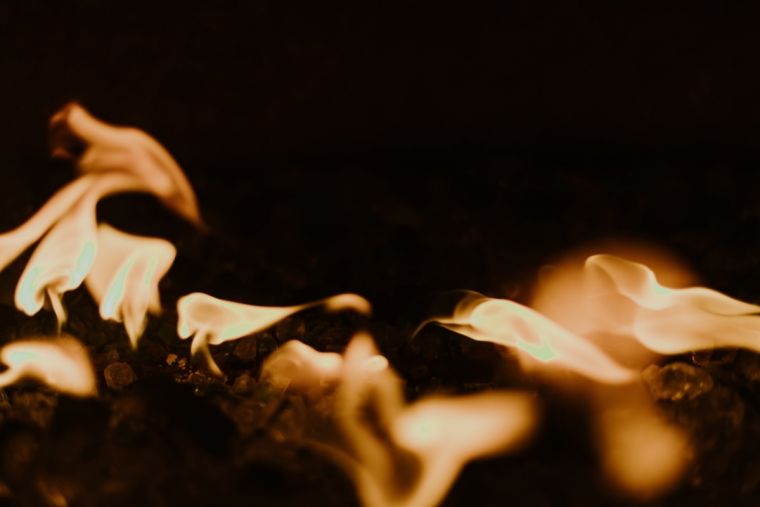A Satanist and a vicar debate Hell

At the launch of controversial new theologically charged novel Complete Darkness by Matt Adcock, a vicar and a Satanist met to discuss 'Hell' in Kings Cross Station's Parcel Yard pub.
The discussion was inspired by the plot of the novel which imagines that in the near future mankind maps Hell and inevitably very bad things happen as a result.
The novel hit number one on the Amazon Christian Fiction Chart at launch and has been described by Russ Bravo as "weaving a gripping theological thread into the story of a corrupt and depraved world designed to grab the attention of a contemporary audience weaned on superhero movies, gritty crime dramas and graphic novels."
First to speak was Ben Dean, chairman of the Church of Rational Satanism, founder of Satanic Recovery and author of Uncover Satan, Recover Thyself.
"So what is hell to me? I guess it's that 'satanic rabbit hole', it's something that grabs my attention, ignites my imagination, sparks my creativity and furthers my desire to gain knowledge of the hidden and unseen," he said.
He said that pop, horror, underground cultures and even plenty of literary works, like Milton's Paradise Lost, Dante's Inferno, and Byron's Cain, "thrive on the aesthetic it [hell] provides".
"On a side note I feel it's worth pointing out that the Latin occultus means 'hidden or secret' and therefore the study of the occult is simply 'knowledge of the hidden' which also links in really well with Hel and Hades or the 'hidden' and 'unseen one' as the occult is often considered as being Satanic," he said.
Before Ben delved into the satanic concepts of what Hell is, he explored the mythological and literary realms of the underworld as well as some of the Amharic interpretations of Hell, and the Germanic origin in the Norse goddess Hel, through to Hades, Pluto and the Egyptian Duat. He also looked at the Christian, Jewish and Islamic concepts including Christ's descent in the underworld.
Rev Peter Laws explored the idea that the classic image of hell may not be as biblical as we think.
"People say Jesus talked more about hell than anybody else, but he often talked about Gehenna - a valley outside of Jerusalem, which was indeed a grim place. Yet we can't just transplant that onto our idea of hell. That hell, with the sulphur and fire, owes more to medieval poetry, like Dante's Inferno, or artists like Bosch or Michelangelo than it does the Bible."
He suggested that the fire images of the Bible tended to be about cleansing or refining, rather than pure destruction. "You don't refine gold in the fire to destroy the gold, you do it to get rid of the impurities, and then you keep the treasure."
He argued that the Bible seems to have a range of views on the topic of hell, with some verses supporting eternal torment, while others suggesting that all may be saved in the end. (1 Cor 15:22, Romans 5:18, Colossians 1:20 were just a few examples).
Where the Bible appears to have clashing views on a topic, he suggested it made sense to err on the side of God's character as revealed in Jesus.
He posed the questions of whether Jesus appeared to be the type to punish and torture people forever, and whether teachings like loving our enemy and not destroying them can say something about his views on Hell.
He pointed to how growing numbers of Christians were coming to reconsider their views on Hell, although a generous view of salvation isn't anything new and can already be found in early church writings such as the work of Origen. He also raised some more questions concerning hell.
"At what age does a person become accountable for their eternal destiny? If it's 12, then wouldn't it be kinder to kill people at 11 years old?"
This is the question behind his first novel Purged, in which a Christian serial killer baptises adults, then murders them immediately afterwards to save them for Heaven.
"But also, how much faith is saving faith?" he asked.
"What about those who serve God through fear of Hell. Are they performing good works for selfish reasons? And what about the example we see from parenting. Would a mother or father build up a relationship with a child, but when they struggle to have faith in a certain belief, they are punished forever? This seems to clash with our sense of parenthood.
"If we are made in the image of God, perhaps our personal reticence about this shouldn't be ignored. He also pointed out the hypocrisy of us saying Hell must be there to punish the bad guys like dictators or serial killers - because did Jesus say that even if we look at someone in anger, we have committed murder? We're all as broken as one another."
In the end, Peter said that it was still possible that the classic image of Hell existed, but argued that the Bible is not as clear on the topic as Christians can sometimes assume and that individual conscience and the character of Jesus shouldn't be dismissed in this discussion.
Author Adcock only describes Hell briefly in the novel in the passage: "It is like the air itself is pregnant – like something is about to burst through to our world from another dimension... A darker, fiery dimension..."
Complete Darkness is available in paperback from bookshops and kindle version via Amazon.co.uk











